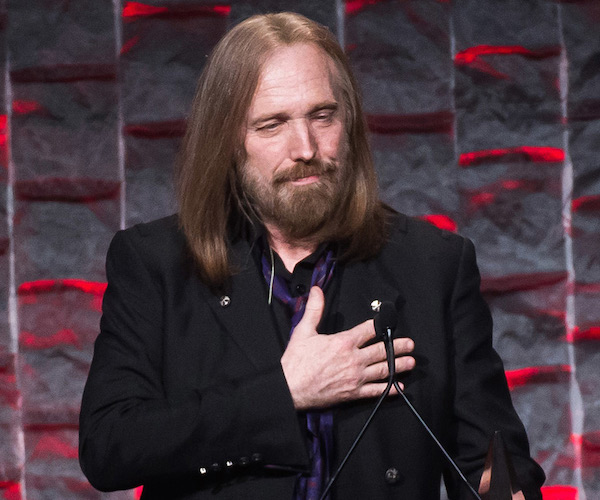Rock Remembrance: Tom Petty — Everyman’s Songwriter
Tom Petty managed to not only survive but thrive in the ever-changing music world.

The late Tom Petty — his best songs had a subversive bite under all the catchy harmonies. Photo courtesy of WRSI.
By Matt Hanson
Maybe the best way to appreciate what Tom Petty, who died recently at 66, was is to talk about what he wasn’t. Petty wasn’t a Nobel Laureate like Dylan, or a guitar maestro like Neil Young. He didn’t have the seductiveness of Leonard Cohen or the dynamism of Bruce Springsteen. His reedy, slightly nasal voice didn’t quite croon or howl the way that rock stars usually do. But what Tom Petty and his Heartbreakers had was songs, great ones, and this made him every bit the equal of any of his contemporaries. Over a career that spanned generations, Petty became everyman’s songwriter.
Mark Twain once remarked that he thought of his books as water, because “everyone drinks water.” This egalitarian approach is part of what made Petty a mainstay in American music. Based on the outpouring of love after news of his passing hit the airwaves, Petty was the soundtrack to several generations of listeners. I doubt I’m the only one who learned to play guitar by listening to his songs, usually taped from the radio or in concert with my parent’s record collection. He had a skillful way of bridging the narrow but deep gap between “pop” and “rock” — and managed to combine the best of both worlds. Petty had a knack for writing songs whose lyrics and melody you would instantly remember after listening to them once, which may sound easy until you realize how many have tried it and never gone as far as Petty did.
Petty’s best songs had a subversive bite under all the catchy harmonies. “Free Fallin” has a lovely chord progression and an epic singalong chorus, but then you notice a verse about vampires wandering through LA and the narrator longs to “free-fall out into nothing/ gonna leave this world for a while.” The vibrant “American Girl” features a feisty young lass who was “raised on promises” — the ambiguity of the phrase is perfect, particularly for a country that has always made promises it’s been unable or unwilling to keep. “Into The Great Wide Open” teases a hapless, wannabe pop star for being “a rebel without a clue.” The scenario of “Running Down A Dream” is classic road trip bliss — the radio’s on and the windows are rolled down, but whether or not the narrator will actually achieve the dream in question is left up in the air. 1994’s Wildflowers is, to my mind, his masterpiece — a record that alternately rocks the house and tugs at the heartstrings. The sturdy lead single “You Don’t Know How It Feels” was censored on the radio for referencing smoking ganja, which feels quaint at this point in history.
Petty always had a knack for eye-catching videos, a shrewd move in the MTV dominated ’80s. Then there’s the cryptic “Mary Jane’s Last Dance” which features a deliciously eerie video where Petty plays a mortician obsessed with Kim Basinger’s pallid corpse, a song and visual pairing that casts an unexpectedly Gothic pall. The spacy “Don’t Come Around Here No More” takes a trip through a Lewis Carroll Wonderland with Petty as a purple-clad Mad Hatter belching smoke at the camera.
His battles with the record industry were also a part of his contrarian streak. Refusing to accept that a corporate merger meant a change in the ownership of his music, he declared bankruptcy and found another recording label. Back in the days when people paid for music, MCA wanted to charge his fans a dollar more for 1981’s Hard Promises, pushing the price from $8.98 to $9.98. Petty countersued, touring to pay his legal fees. After a grueling stretch of litigation, the price remained where it had started.
There was a commendable lack of drama throughout Petty’s long career. No rehab stints, no epic beefs in the press, no public meltdowns or taking decades off to “think” about his “sound.” Petty just did the work, writing and recording and playing sold-out concerts for decades, everywhere from the Super Bowl to the Rock and Roll Hall of Fame, of which he was a first round inductee. He also acted in movies (including a substantial role in Kevin Costner’s incomprehensible epic The Postman), and was noted for his philanthropy. He wrote hits for Stevie Nicks, Grace Jones, and Roy Orbison and penned what was far and away the best Traveling Wilburys song (“End of the Line”), which is no mean feat considering the musical Mount Rushmore membership of the group. Petty managed to not only survive but thrive in the ever-changing music world, from wearing skinny ties and being dubiously marketed as “new wave” to assuming the status of laureled elder statesman. According to reports, he died just days after a series of farewell concerts in Los Angeles, giving his all up to his very last breath.
Matt Hanson is a critic for The Arts Fuse living outside Boston. His writing has appeared in The Millions, 3QuarksDaily, and Flak Magazine (RIP), where he was a staff writer. He blogs about movies and culture for LoveMoneyClothes. His poetry chapbook was published by Rhinologic Press.
